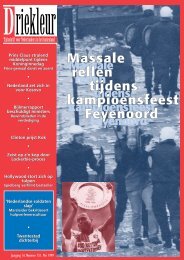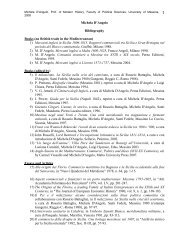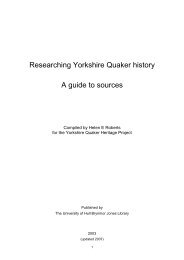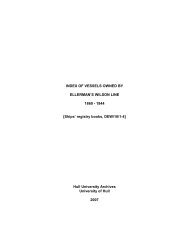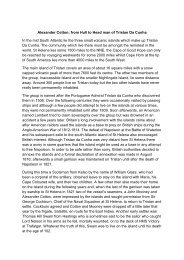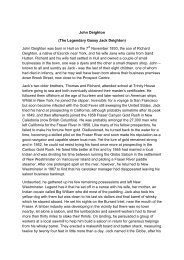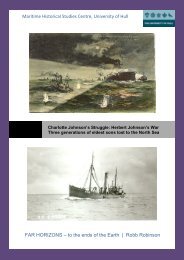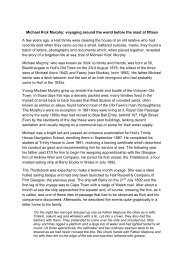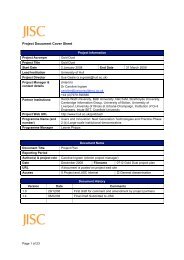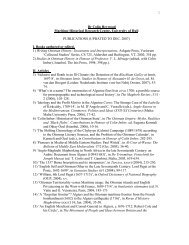The North Atlantic Fisheries, 1100-1976 - University of Hull
The North Atlantic Fisheries, 1100-1976 - University of Hull
The North Atlantic Fisheries, 1100-1976 - University of Hull
You also want an ePaper? Increase the reach of your titles
YUMPU automatically turns print PDFs into web optimized ePapers that Google loves.
is also apparent, few authors having attempted to place their particular<br />
subjects in a national, let alone, international, comparative setting. <strong>The</strong><br />
net result <strong>of</strong> these shortcomings is that a rigorous, comprehensive history<br />
<strong>of</strong> the British fisheries has yet to be written.<br />
<strong>The</strong> present paper draws upon the available literature to sketch an<br />
outline <strong>of</strong> the development <strong>of</strong> sea fishing in the British Isles in the six<br />
centuries prior to <strong>1976</strong>. It considers the commercial sea fishing<br />
operations <strong>of</strong> the inhabitants <strong>of</strong> England, Wales, Scotland and Ireland in<br />
the <strong>North</strong> <strong>Atlantic</strong>. Disregarded are river and estuarial catches, the<br />
exploitation <strong>of</strong> shellfish, and the fisheries prosecuted from Britain’s<br />
overseas colonies. Whaling, as a producer <strong>of</strong> oil rather than food, is also<br />
neglected. <strong>The</strong> chronological bounds <strong>of</strong> the paper extend from the late<br />
fourteenth century to <strong>1976</strong>, with a division drawn in the mid-nineteenth<br />
century when the conveyance inland <strong>of</strong> fresh fish heralded the greatest <strong>of</strong><br />
the many watersheds in the history <strong>of</strong> British fishing. While the<br />
contributions <strong>of</strong> social and political historians are recognised, a largely<br />
economic approach is adopted, with fishing treated as an industry rather<br />
than a way <strong>of</strong> life or a factor in international relations. <strong>The</strong> paper<br />
considers the historiography <strong>of</strong> this broad subject and concludes with<br />
some tentative suggestions as to the chief weaknesses in the literature.<br />
Limited Markets<br />
A petition was laid before Edward III in 1376, complaining that:<br />
where in creeks and havens <strong>of</strong> the sea there used to be plenteous fishing, to the pr<strong>of</strong>it<br />
<strong>of</strong> this Kingdom, certain fishermen for several years past have subtily contrived an<br />
instrument called ‘wondyrechoun’ made in the manner <strong>of</strong> an oyster dredge, but<br />
which is considerably longer, upon which instrument is attached a net so close<br />
meshed that no fish be it ever so small which enters therein can escape, but must stay<br />
and be taken ... By which instrument in many places, the fishermen take such<br />
quantity <strong>of</strong> small fish that they do not know what to do with them ... . 198<br />
As well as serving as a convenient departure point for the present survey,<br />
this first recorded reference to trawling in British waters highlights<br />
various features <strong>of</strong> the country’s medieval and early modern fisheries. It<br />
illustrates quite clearly the evidential problem facing fishing historians,<br />
for it is essentially an isolated piece <strong>of</strong> information which <strong>of</strong>fers little<br />
indication as to how widespread was the use <strong>of</strong> the wondyrechoun, let<br />
alone any measure <strong>of</strong> the significance <strong>of</strong> trawling at this time. Incidental,<br />
198 Alward, Sea <strong>Fisheries</strong>, xx.<br />
122



